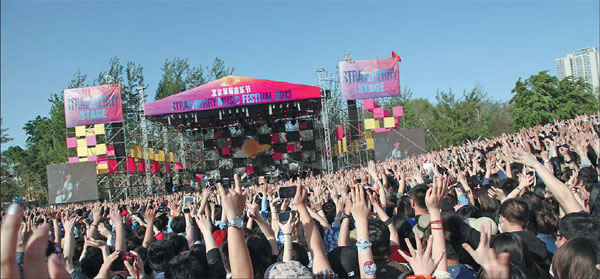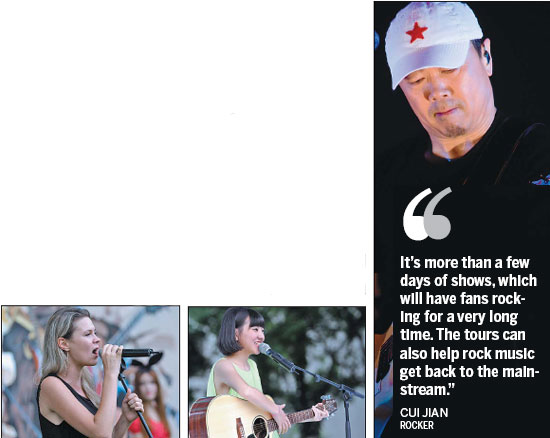Tunes that travel
Updated: 2013-08-16 07:49
By Chen Nan (China Daily)
|
||||||||
|
The country's outdoor music festivals are growing rapidly, spreading from the big cities to the second- and third-tier cities. One of the most popular is the Strawberry Music Festival. Xu Xinlei / Asia News Photo |
Music industry veteran Song Ke has a new plan to save the business. He is organizing large-scale outdoor music festivals to tour 60 cities around China for a year. Chen Nan finds out the details.
Being a central figure in the development of China's music industry for nearly two decades, Song Ke seems to have a little monster in his head guiding him to make wise decisions. "I am a good foreseer of music market," says the 48-year-old Song with confidence. "When I watch music shows on TV while studying in the United States in 1990, I could tell which song would be a hit and which singer would be popular. Within three months, the news would confirm my judgment."
It could be an inborn talent coupled with his science training at Tsinghua University, which had provided him with sound logical thinking.
In the transforming music industry where traditional market formula is dying, Song has announced a new plan to save it.
Instead of holding an outdoor music festival once a year, 60 outdoor music festivals titled Evergrande Star Music Festival will be held in 60 cities around China from Sept 14 until August 2014.
The plan is this: Two neighborhood cities will have the music festival, one on Saturday and another on Sunday, each with a target audience of more than 20,000.
The first two cities to launch the festival will be Xi'an in Shaanxi province and Zhengzhou in Henan province.
According to Song, the general manager of Evergrande Music, although the tours were solidified early this year, the idea was mooted years ago.
Evergrande Music is a music company under the Evergrande Real Estate Group, one of the country's largest real estate developers.
"I have been researching the Chinese film market for years. What makes the film industry successful with millions in revenues? Even some bad movies sell well," says Song, "because watching films during weekend is becoming a lifestyle among Chinese young people. Why don't we run the music business like the film industry?"
To attract young people back to the music scene without spending too much, tickets for the music festival will be priced the same as the movies in the city - below 100 yuan ($16).
It's a bold idea and Song's friends told him that it's crazy because holding one three-day music festival consumes lots of money and energy, let alone 60.
He is not worried about the money because he has sponsors. What he aims for is to make attending a music festival a habit for young Chinese people, just like watching movies.
Gao Xiaosong, the managing director for Evergrande Music's music department, says among all the forms of products in China's music industry, outdoor music festivals have developed fast and well.
"In the United States, every weekend you can enjoy some musical events at open squares. That is what we need," he says.
"We hope the new way of enjoying music could be healthy and helpful to the development of China's music market."
With two stages, pop and rock, the music festivals will have a mixture of big stars and new singer-songwriters from the local cities.
The first star Song invited is China's godfather of rock 'n' roll, Cui Jian, who will perform at more than 20 stations.
"He is the symbol of China's live music scene and I believe he can help ignite the passion of music festivals," Song says.
Cui is excited about the tours.
"It's more than a few days of shows, which will have fans rocking for a very long time," Cui says. "The tours can also help rock music get back to the mainstream."
He also points out that the outdoor music festival is still new in China and takes time to be widely accepted by audiences.
Most of the outdoor music festivals in China are held in developed cities like Beijing, Shanghai and Guangzhou. It is not a healthy trend for the music industry, Song says.
He had spent a year watching live house shows at second- and third-tier cities, where he observed the potential of new music powers.
"I found very good singers at small bars in those smaller cities but they don't have the chance to perform on a larger stage. Our music festival tour will give those artists the opportunity," he says.
It's not the first time that Song has broken conventions in the industry. In 1996, he spent 200,000 yuan to help Gao Xiaosong, who was also a student of Tsinghua University, release the album Youth with No Regrets. It proved to be a sound investment. The album sold millions of copies in China and kicked off an era of campus ballads music genre.
Then the two joined hands to form Taihe Rye Music Company, discovering and producing albums for many pop stars, like Pu Shu, Lao Lang and Li Yuchun.
As the former general manager of Warner Music China, Song was the earliest to produce and publish digital music in 2003. The ring tone download service earned him 20 million yuan in 2004.
In 2008, he withdrew from the scene and opened a Peking roast duck restaurant in Beijing's CBD area. Upon his return in 2012 to work at Evergrande Music, his focus was on purchasing copyrights from indie labels such as Thirteen Months Company and TV shows.
Among them include the popular talent show Chun Wan Express, which selects new artists to perform at CCTV's Chun Wan, the most-watched annual Spring Festival Gala.
Song opines that there is a missing link in the music industry between singer-songwriters and the audiences.
He points out that as the number of TV shows broadcasting music videos and radio program introducing new songs reduces, talented Chinese singer-songwriters do not have a regular and effective platform to introduce their music.
On the other hand, young music fans are eager to listen to different types of new songs, which is why they visit live shows in bars, watch talent shows on TV and listen to online music to discover new faces and new works.
"When I was in the university, everyone listened to the same song, like Cui Jian's. But today, young Chinese music fans want a variety of music, which displays their individualities," he says.
Shen Lihui, the founder and director of Modern Sky, one of the largest indie music labels in China, says the music festival tour is another business form to run the music industry.
"The main contribution of having the outdoor music festival tour for such a long time is to widen the influences of outdoor music festivals among Chinese audiences," says Shen, who founded Strawberry Music Festival, one of the country's biggest outdoor music festivals, in 2009.
He also says that since the market of music festivals in China is still new, he is not worried about competition, and there is room for growth. With about 100 outdoor music festivals already taking place around China every year, he predicts that more than 500 music festivals will be held in the next three to five years.
Contact the writer at chennan@chinadaily.com.cn.
|
Evergrande Star Music Festival will be held in 60 Chinese cities, featuring both established musicians and young talents, like Sensitive Flower (left), Zhou Ziyan (middle) and Cui Jian. Photos by Zou Hong / China Daily |
(China Daily USA 08/16/2013 page14)

 Thrills in store for Chicago Air and Water Show
Thrills in store for Chicago Air and Water Show
 Demolition work starts on rooftop villa structure
Demolition work starts on rooftop villa structure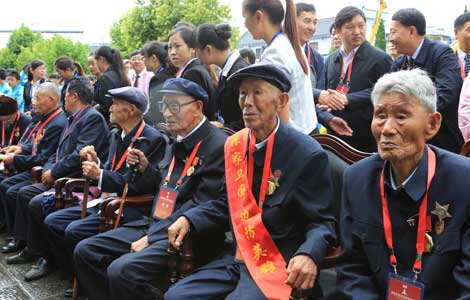
 Memorial to expeditionary soldiers opens
Memorial to expeditionary soldiers opens
 Death toll from Egypt violence rises to 638
Death toll from Egypt violence rises to 638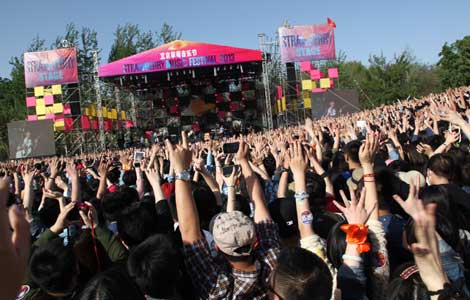
 Tunes that travel
Tunes that travel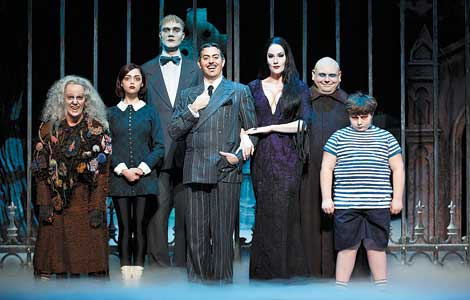
 Macabre Addams Family tests musical tastes
Macabre Addams Family tests musical tastes
 Spielberg has desire to work with Zhang Yimou
Spielberg has desire to work with Zhang Yimou
 Li Na advances to 3rd round at Cincinnati Open
Li Na advances to 3rd round at Cincinnati Open
Most Viewed
Editor's Picks

|

|

|

|

|
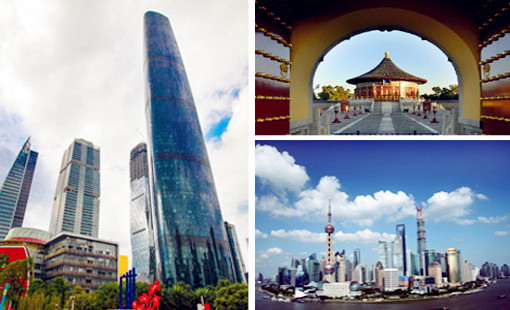
|
Today's Top News
Exporters take heart from signs of US rebound
Clinton: US behind China in Africa
Chinese reduce Treasury holdings
Canadian deal boosts Chinese aircraft ambitions
The 'bad boys from Boston' are set to rock Shanghai
Global universities ranked by survey
No remorse as Abe marks surrender anniversary
China to be world's No 1 consumer
US Weekly

|

|
